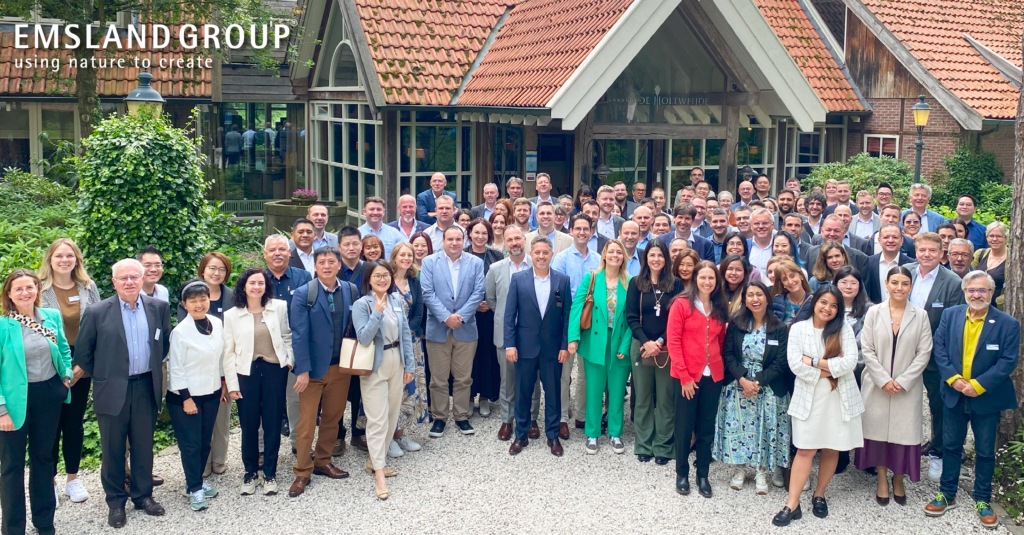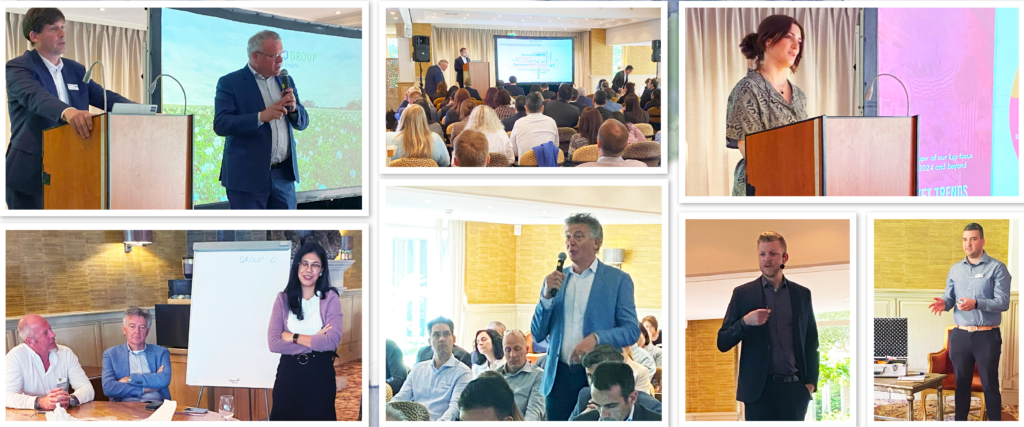The Emsland Group hosted their biennial collaborative event for agents and distributors
Over the course of two days, the sales teams and distribution partners participated in presentations, workshops, poster sessions and social activities. The gathering, which takes place every two years, was newly structured to foster a valuable exchange and the sharing of information.

The attendees were welcomed to the picturesque landscape of the Dutch countryside in a traditional-style hotel and conference center.
On the first day, Dimitrios Mousios, Sales Director of the Emsland Group, expressed his excitement for the outcome of the two days. He also gave a presentation on the company’s sales approach, in which he emphasized the importance of further optimizing customer support and growing the cooperation with the agents and representatives of the Emsland Group.
Christian Kemper, CSO of the Emsland Group, provided an overview of the strategic outlook of the company through 2030. In addition to mentioning the strong market position in various segments, Kemper laid out the company’s plan for climate neutrality aimed for 2040 — years before EU regulatory requirements demand so. In terms of products, he emphasized that, although other industry participants’ faith may have waivered, the Emsland Group believes strongly in the potential of the potato. Kemper explains, “We are ready for further investment, as seen by our planned flakes factory in Emlichheim, we just need to ensure that those factories are supplied with the necessary potato volumes.”
A similar sentiment was reiterated by Gerrit-Jan Wesselink, CEO of the Emsland Group, in his presentation on the topic of the market and raw materials. Wesselink presented under the umbrella theme of “facing reality.” Despite a global decrease in potato farming production, the demand for potatoes continues to increase, especially due to the French fry industry. The company has a clear and realistic goal: maintain and grow the quantities of potatoes supplied to meet customer requirements. He explained that, thanks to competitive pricing and proven support for suppliers, the Emsland Group has developed trusted and loyal relationships, which have helped secure the raw materials for us and hopefully continue to do so well into the future. Wesselink concluded, “We expect major upheavals in EU potato production, which will result in a significant reduction in potato starch production. We are doing everything we can to ensure that we can continue to supply customers as required in the future.”

In his presentation, Andre Heilemann, Director of Research & Development at the Emsland Group, discussed how the feedback and information gathered at such get-togethers like this help shape the focus in development activities to be even more customer-oriented. He also laid out a training plan that is offered for the agents and distributors, including annual invitations to the Innovation Center in Emlichheim for in-person application trainings and informational sessions. Additionally, he highlighted plans to increase sustainability efforts by finding new innovative ways to utilize the complete raw material and conserve energy usage.
Cindy Semeijn, Head of Business Development & Marketing, provided an update on Marketing activities and new developments for the support of sharing information and providing marketing resources for the agents, including usage of an internal online platform.
After the lunch break, participants were divided into mixed groups to participate in workshops. The purpose of each workshop was to identify areas of opportunity and needs within the many markets the Emsland Group serves. After rich discussions and brainstorming, the results from the workshops were presented to the group as a whole. All attendees then voted digitally, with results being shown in real time, on the themes they felt should be examined further. The results from the poll provided guidance for the second day’s workshop.
The first day of the conference also included a guest speaker from Leben Ingredients, an agency located in Italy. Emanuela Agnoletto explained how the company increased their turnover fivefold within four years. By broadening their portfolio, investing in own application facilities and expanding warehouse capacities, the company evolved to being a major player in the sale of food ingredients and serves as an example of the possibilities for an agency with an entrepreneurial mindset.
The day was concluded with a reception in which a poster session was held. Each attending company created a poster highlighting an interesting project from their region. The Emsland Group Board of Directors were invited for this part of the program and had the chance to discuss the content directly with the involved agents and representatives.
Day two of the conference began with a presentation from guest speaker Simon Bentley, founder of the agribusiness advisory company Commoditia. In his detailed and informative presentation, Bentley focused on the opportunities and challenges for the starch industry in the different world markets. He explained the intricate push and pull relationship that the different product prices have on each other, and the unique challenges facing different regions. Particularity in the EU, the biggest challenge will be maintaining productivity in local fields; however, thanks to the growing popularity of pea and potato products, and the supply issues facing the main competing products, he sees a positive outlook for the industry as a whole.
Hannah Pegg of the Healy Group, a daughter company of the Emsland Group, presented on current market trends and the influence of social media on consumers. Particularly focusing on the topics of “natural” and “clean label,” Pegg discussed studies that showed that the vast majority of consumers in the UK are willing to pay premiums for food items deemed “healthy,” and that many have a negative perception of the term “processed.” At the same time, however, the addition of processed ingredients for the sake of fortification, added protein or higher fiber, is seen as health beneficial. The simultaneous vilification of processed foods and celebration of “healthy” (processed) foods shows the lack of unanimous understanding of the terms. Adding to this confusion is the increasing popularity of social media influencers and non-scientific viral “experiments” on the perceived harms of “ultra-processed foods,” as well as a growing pressure from some governments in the form of taxation or labeling requirements on such items. According to Pegg, there is a large potential for consumer education, especially in the form of packaging or marketing, to help explain the purpose and benefits of certain processed ingredients.

The final guest speaker of the conference was Ieme Blondeel from the confectionery company, Cloetta. In a transparent analysis, Blondeel explained how and why the company is moving towards the use of plant-based ingredients. He highlighted the support from the application specialists at the Emsland Innovation Center — the Emsland Group and Cloetta are working closely together to transition the company away from gelatin. Through their strategy, the company looks to not only expand their market but also be more sustainable and considerably lower their carbon footprint.
To conclude the two-day conference, Dimitrios Mousios provided a preliminary summary of the workshops and hosted a live feedback session. Finally, the company management shared their appreciation to the participants and organizing committee. Gerrit-Jan Wesselink offered these closing words:
“We will make it through these challenges by supporting each other and continuing the kind of collaboration that I have seen over these past two days — we have a bright future as long as we step forward together.”
